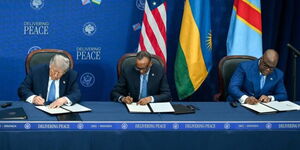The Kenyan shilling ended the week steady against the US dollar, bolstered by the Central Bank of Kenya’s (CBK) strategic interventions.
Despite the dollar climbing to a two-month high earlier in the week, the shilling held its ground, closing at Ksh129.20 against the dollar, a marginal shift from Ksh129.19 the previous week.
The dollar had been gaining strength throughout the week, trading at Ksh128.50/Ksh129.50 on Thursday, marking the highest recorded exchange for the shilling. However, the US currency eased slightly on Friday, driven by profit-taking after sharp rallies against major global currencies, alongside Chinese economic data influencing the forex market.
The CBK’s stabilisation measures, including regular dollar injections into the market, helped keep the shilling's value in check. Kenya’s forex market has seen relative stability in recent months, thanks to increased diaspora remittances, robust tourism inflows, and higher agricultural export earnings, particularly from tea.
These factors have provided a buffer against external shocks such as political unrest and the delayed disbursement of a loan from the International Monetary Fund. As a result, the currency’s stability has relieved households burdened by rising costs.
The steady shilling has also impacted inflation positively, with September witnessing a drop in the year-on-year inflation rate to 3.6 per cent, down from 4.4 per cent in August. This decline reflects the reduced prices of imported goods, making essential commodities more affordable for Kenyans.
Additionally, the month-on-month inflation remained flat at 0.2 per cent, illustrating the benefits of a stable currency on everyday consumer expenses.
Fuel prices have followed suit, with the Energy and Petroleum Regulatory Authority announcing cuts to Super Petrol, Diesel, and Kerosene prices from October 15. The reduced fuel costs are expected to lower transport and production expenses across multiple sectors, offering further relief to consumers and aiding efforts to curb inflationary pressures.
Earlier in the year, the Kenyan government issued a $1.5 billion Eurobond aimed at easing investor concerns by refinancing a maturing $2 billion bond. This move reassured international investors who had been spooked by the risk of Kenya defaulting on its dollar-denominated debt, further stabilising the shilling in the process. The Eurobond strategy formed part of a broader push by the CBK to prevent sudden currency swings that could destabilise the economy.
Investor confidence has been gradually restored in the capital markets, which had previously been shaken by currency depreciation and challenges with dividend repatriation. The stability of the shilling has attracted renewed interest from foreign investors, particularly in Kenya's agriculture and tourism sectors, as they seek out opportunities amidst a favourable currency environment.
While Africa as a whole has experienced a slowdown in private equity and venture capital investments, Kenya's resilient currency positions it as a more appealing destination for foreign capital. The reduced currency-related risks encourage investment in sectors known for delivering stable returns, such as agribusiness and infrastructure development.












